For digital marketers wanting to include video in their content, or get inspiration, video search engines give you a simple way to sort through the millions of videos available online.
Video content is one of the most popular forms of digital media today, and many brands are already experimenting with either YouTube, Instagram, or TikTok.
Anyone not using video should consider integrating video into their strategy moving forward.
According to HubSpot research, short-form video is the No. 1 format – offering the highest return on investment (ROI) – and will see the most growth in 2024.
Bloggers have also increased the use of videos within their content, having doubled their usage in the last 10 years to help improve engagement.
To help you find the perfect video for your content – or inspiration and ideas to create your own videos – we looked at some of the best video search engines you can use.
10 Video Search Engines You Should Use To Find Video Content
1. Google
- Headquarters: Mountain View, California, United States.
- Launched: 1998.
- Founders: Larry Page & Sergey Brin.
The most popular search engine out there, Google possesses 91% of the search traffic worldwide, putting it significantly ahead of any competitor.
Google processes over 40,000 search queries every second on average, adding up to around 3.5 billion searches per day, which is why it has such a dominance in SEO.
As the Google Search index is well over 100 million gigabytes and billions of pages, Google has a huge span of sources from across the internet, including YouTube, Facebook, Vimeo, and more.
That breadth of index makes it unrivaled for video searches and compiling research on video topics. Google is an easy first choice to search for videos with options to match content to keywords.
First, type in your keyword and search; on the results page for certain queries, you can see a video carousel.
Being able to gain a position in this carousel can deliver considerable visibility for a brand. Specifically targeting keywords that have video carousels is mostly why so many brands have started embedding video in their content pages.
![search for [content marketing], Google](https://marketingnewswired.com/wp-content/uploads/2024/04/the-10-best-video-search-engines-via-sejournal-theshelleywalsh.png) Screenshot from search for [content marketing], Google, February 2024
Screenshot from search for [content marketing], Google, February 2024If you then click the Videos tab, you can get the full list:
![Screenshot from search for [content marketing], Google](https://marketingnewswired.com/wp-content/uploads/2024/04/the-10-best-video-search-engines-via-sejournal-theshelleywalsh-1.png) Screenshot from search for [content marketing], Google, February 2024
Screenshot from search for [content marketing], Google, February 2024When it comes to video searches, because it offers so much choice, Google could be considered a fire hose when trying to find video. So, some of the more niche video search engines can surface better results.
2. YouTube
- Headquarters: San Bruno, California, United States.
- Launched: 2005.
- Founders: Steve Chen, Chad Hurley & Jawed Karim.
YouTube is the second most-visited site in the world, ranking right behind Google in terms of popularity, which makes Alphabet Inc. dominant in search as the parent company of both brands.
A significant 81% of U.S. adults use the video-sharing platform, making the site a powerful draw for marketers and brands.
More than 500 hours of video are uploaded to YouTube every minute, and YouTube viewers watch over 1 billion hours of video each day.
Over the years, YouTube has redesigned how its search function works to promote different types of videos. Most recently, YouTube has added a push for short-form content to compete with other social media platforms such as TikTok and Instagram’s Reels.
Shorts are only highlighted as a carousel on some keywords, and as you can see below, “cute cats” is an example. As a note, “content marketing” did not have a Shorts carousel.
You can clearly see how many plays are linked to all videos shown, giving you a glimpse into all-time performance – with the longer-form videos also highlighting how long they’ve been active.
![search for [cute cats], YouTube](https://marketingnewswired.com/wp-content/uploads/2024/04/the-10-best-video-search-engines-via-sejournal-theshelleywalsh-2.png) Screenshot from search for [cute cats], YouTube, February 2024
Screenshot from search for [cute cats], YouTube, February 2024For some searches, YouTube Shorts will usually appear first on desktop and within the initial results on mobile while scrolling. It will typically provide you with a look at trending short-form video content around your search term, with full-length videos below to help you find both quick content and more detailed videos.
This can be great if you’re looking to find ideas for a new content series or to see how longer videos can be turned into bite-size social cutdowns for Shorts.
Because YouTube is its own platform, you’re likely to find unique videos compared to other video-sharing sites, which you can use as a springboard for your own content.
However, many channels are present across multiple platforms and will upload the same video across multiple sites, so it’s worth being wary of duplicate content.
3. Bing
- Headquarters: Redmond, Washington, United States (Microsoft).
- Launched: 2009.
- Founders: Bill Gates & Paul Allen.
While Bing may be less popular than Google, that doesn’t mean it’s not a useful video search engine to use – it simply works a little differently.
When it comes to Bing’s video platform, there are plenty of differences between Bing and Google that you might not know about which could make it the best choice for your video search.
- Bing offers a grid-based results page for a more visual search experience.
- Videos play directly from Bing, so navigating between videos is easier.
- You can easily see related keywords for expanded searches under the search bar.
- Bing Video Search may suggest key moments within videos related to your search.
Finding inspiring videos on Bing is super easy. All you need to do is type your keyword into the search engine and select Videos.
![search for [content marketing], Microsoft Bing](https://marketingnewswired.com/wp-content/uploads/2024/04/the-10-best-video-search-engines-via-sejournal-theshelleywalsh-3.png) Screenshot from search for [content marketing], Microsoft Bing, February 2024
Screenshot from search for [content marketing], Microsoft Bing, February 2024On the left-hand side, Bing also offers some broad categories where you can explore the latest videos and popular content.
This can help you identify current events and general trends that people find interesting, which can, in turn, help inform your content strategy if you wish to capitalize on recent events.
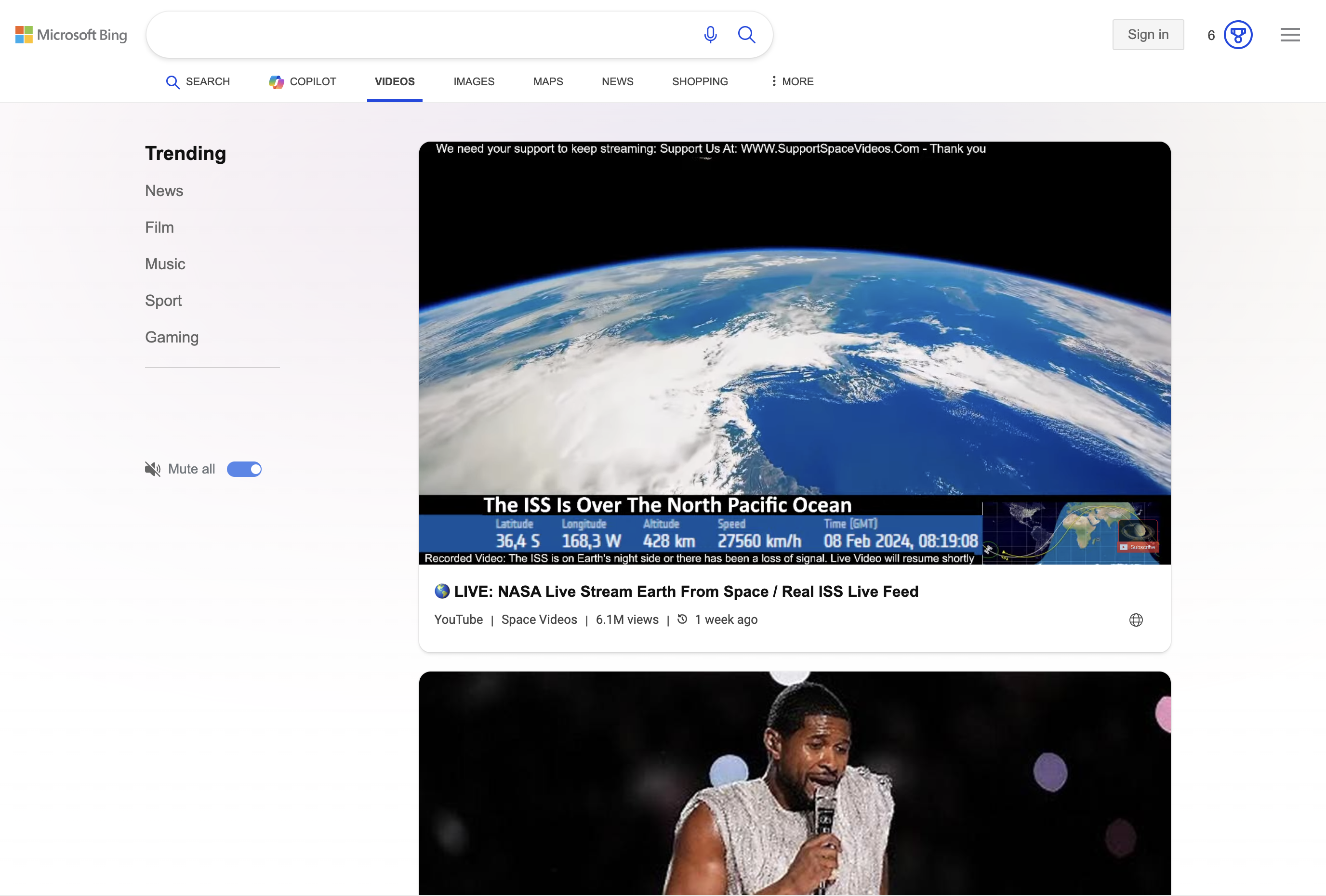 Screenshot from Microsoft Bing, February 2024
Screenshot from Microsoft Bing, February 20244. Dailymotion
- Headquarters: Paris, France.
- Launched: 2005.
- Founders: Benjamin Bejbaum & Olivier Poitrey.
Dailymotion is another popular video-sharing platform with millions of videos and a dedicated audience in Europe, especially French-speaking countries – with the platform reporting 400 million monthly active users.
It was one of the first platforms to feature HD resolution (720p) videos, and – while it isn’t as big as YouTube – it’s still visited more than some major streaming platforms such as HBO Max and Paramount Plus.
A key attribute of Dailymotion to note is that its video library is completely unique, meaning it doesn’t bring in results from external websites.
Users can upload their own videos, similar to YouTube, so performing a video search on Dailymotion will return entirely different results.
On Dailymotion’s homepage, you’ll be shown trending channels on the left side to get an idea of which outlets are popular – but this is limited to partner-certified channels (usually from bigger brands) shown by the checkmark next to a channel’s name.
 Screenshot from Dailymotion, February 2024
Screenshot from Dailymotion, February 2024You can also scroll through trending videos covering the latest news, entertainment, music, and sports.
If you log in, you can follow specific channels to see their branded content first and find some inspiration for your own.
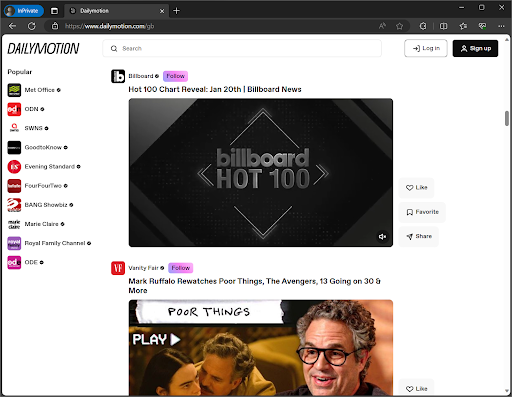 Screenshot from Dailymotion, February 2024
Screenshot from Dailymotion, February 2024If you’re looking for videos on a specific topic, simply search using your preferred keyword at the top and scroll through the various results, or sort your search using different filters.
Because of Dailymotion’s unique library of videos, it can be useful for finding additional content that you might not find on YouTube or from other video search engines that don’t show results from Dailymotion.
5. Vimeo
- Headquarters: New York City, United States.
- Launched: 2004.
- Founders: Zach Klein & Jack Lodwick.
If you’re looking for editorial-style videos or a more curated collection, then Vimeo is a great video search engine choice.
While it started out as a side project to then parent company’s Connected Venture’s comedy website, CollegeHumor, it has grown into its own standalone public company with a significant library of videos.
Vimeo offers both a video-sharing platform and a suite of video creation tools through a software-as-a-service (SaaS) model for enterprises and individuals.
With 350,000 videos uploaded to Vimeo on average per day and around 1.7 million paid subscribers, it also clearly has its own audience that makes full use of the site.
As it has its own vast online video library, you can use Vimeo’s video search engine to discover all sorts of new content exclusive to this platform.
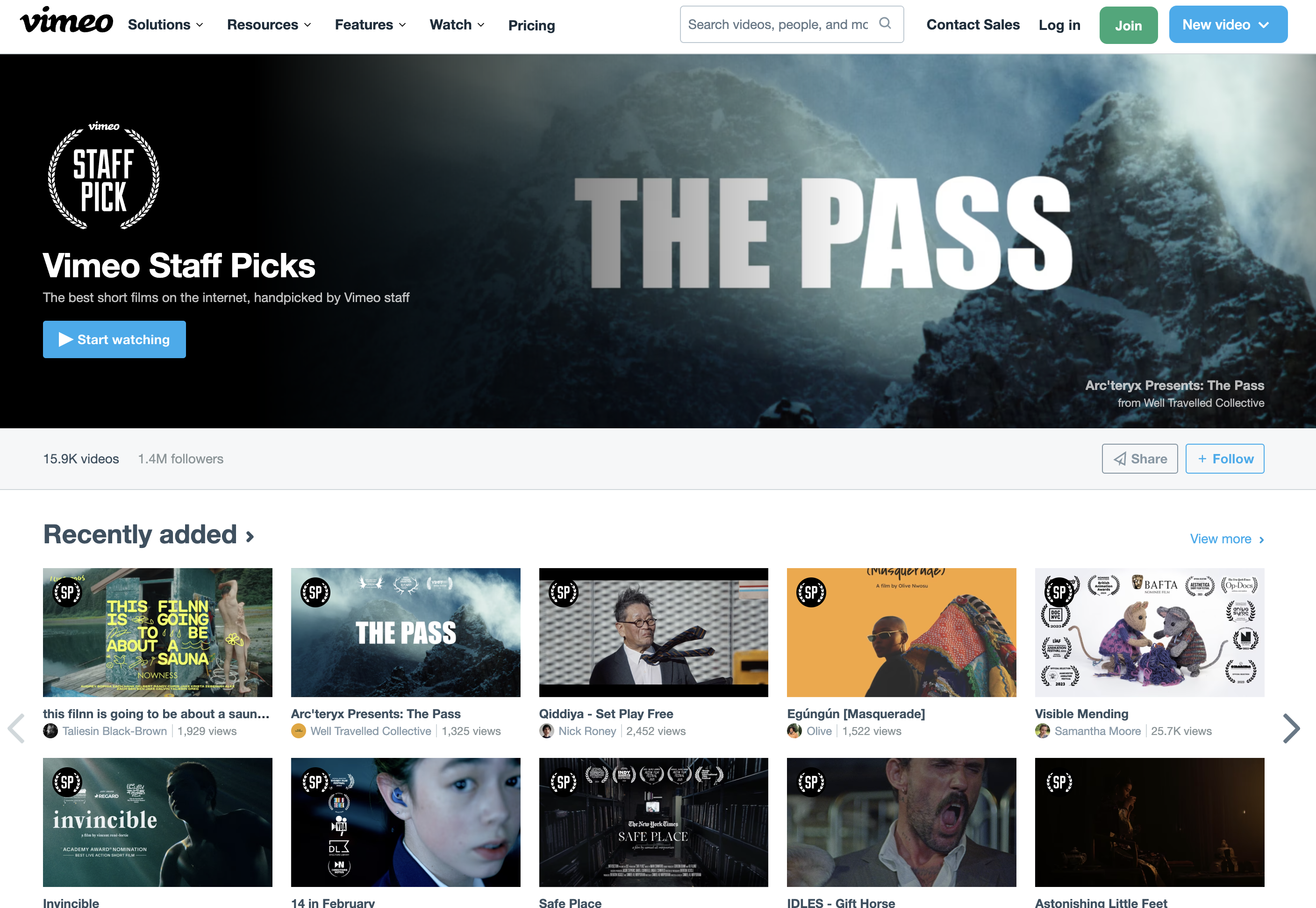 Screenshot from Vimeo, February 2024
Screenshot from Vimeo, February 2024One of its main features is that the team over at Vimeo selects a number of videos to highlight, showcasing high-quality video content across a range of categories, such as documentaries, animation, and comedy.
You’ll frequently see new uploads of short films submitted for a range of international film festivals, such as South by Southwest (SXSW) and Sundance, which can give you a snapshot of praise-worthy video content to take ideas from and feel inspired by.
You can also find video marketing content from a range of brands to help you find inspiration for your own video content, while also serving as an archive for old video marketing campaigns.
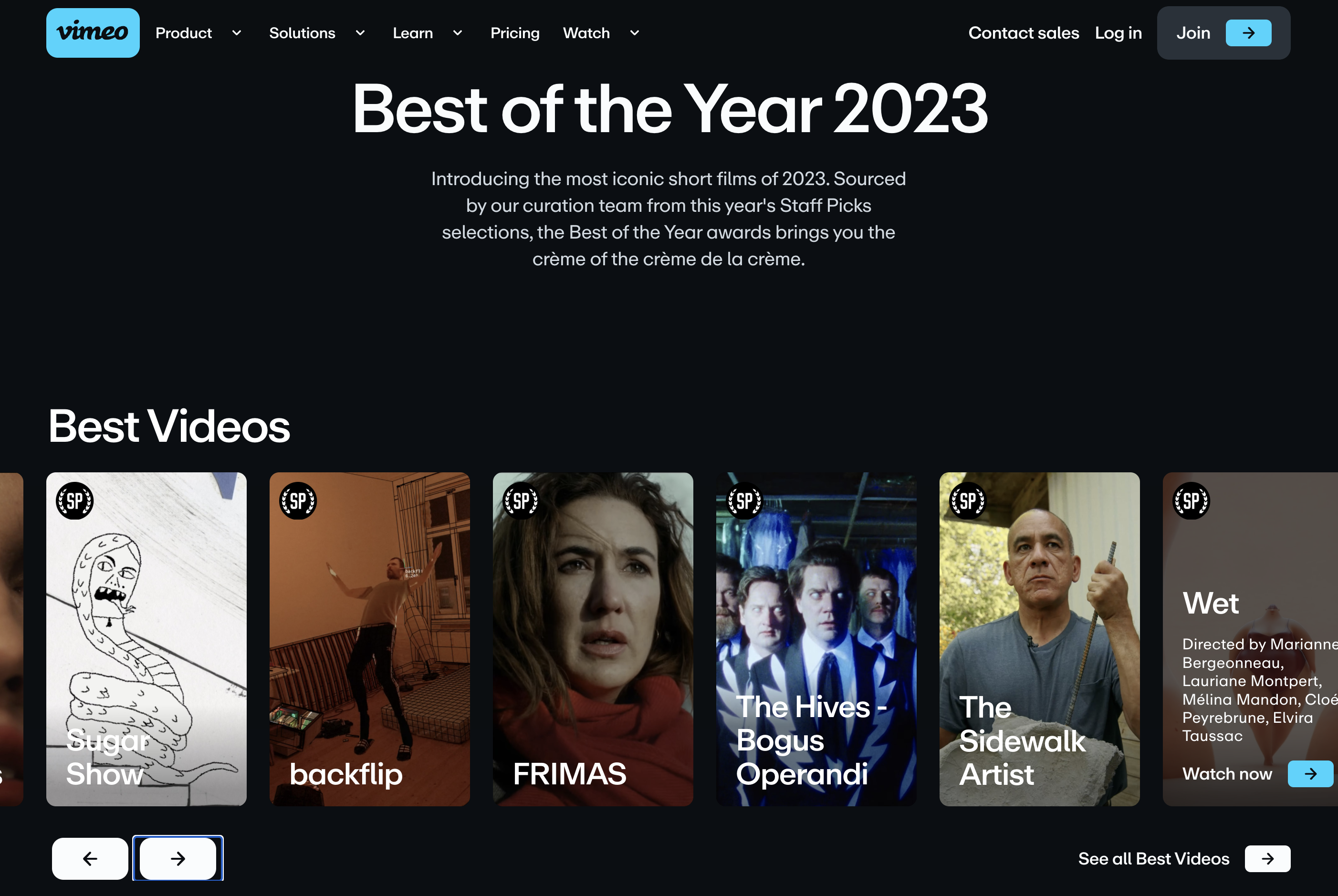 Screenshot from Vimeo, February 2024
Screenshot from Vimeo, February 20246. DuckDuckGo
- Headquarters: Paoli, Pennsylvania, United States.
- Launched: 2008.
- Founder: Gabriel Weinberg.
If privacy is important to you and you don’t like the idea of everything you do online being recorded, then DuckDuckGo could be the video search engine for you.
As a privacy-focused search engine, DuckDuckGo focuses on doing three specific things for its users:
- Blocking trackers.
- Enabling you to search privately.
- Serving results that aren’t based on your previous search history.
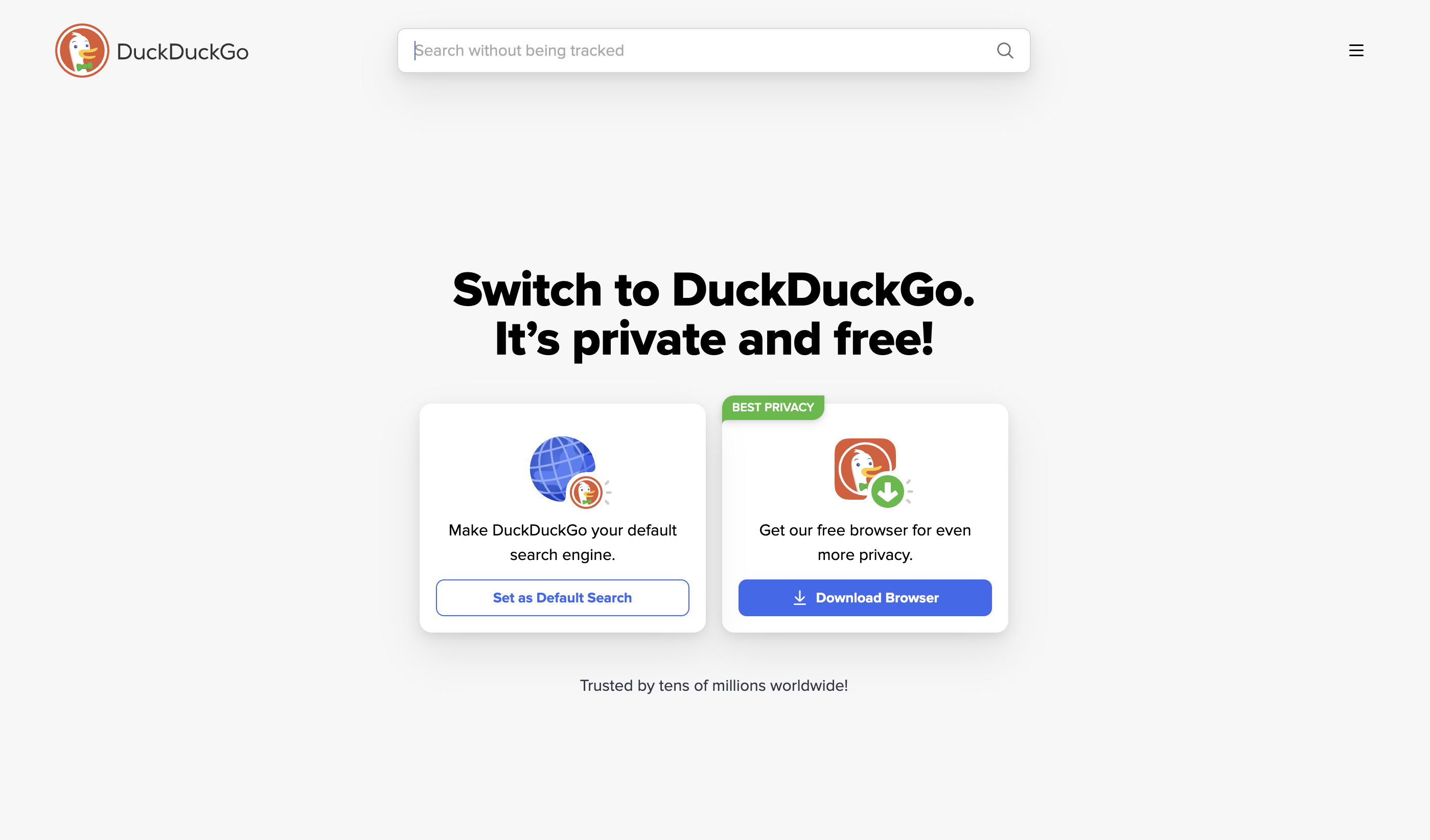 Screenshot from DuckDuckGo, February 2024
Screenshot from DuckDuckGo, February 2024DuckDuckGo keeps things simple with its easy-to-use interface. If you’re looking for videos, simply type in your keyword into the search field and click Videos.
![search for [content marketing], DuckDuckGo](https://marketingnewswired.com/wp-content/uploads/2024/04/the-10-best-video-search-engines-via-sejournal-theshelleywalsh-10.png) Screenshot from search for [content marketing], DuckDuckGo, February 2024
Screenshot from search for [content marketing], DuckDuckGo, February 2024DuckDuckGo pulls in videos from across the web, including YouTube and Facebook, meaning you can privately search video content without being tracked.
This can be great for doing video marketing research, as you can run completely fresh searches outside your potential ‘filter bubble’ that could skew what appears on your search engine results pages (SERPs).
It also makes it easy to run a search based on results for different countries, allowing users to see how the results change and find different content. All you have to do is use the country selector in the top left and select which country you want to base your search on.
If you feel that you could also benefit from having a browser that focuses on privacy to browse the web without a data profile being built, then the DuckDuckGo browser could help you get research done without being tracked.
7. TikTok
- Headquarters: Los Angeles, United States & Singapore.
- Launched: 2016.
- Founder: Zhang Yiming, ByteDance Ltd., Toutiao.
While TikTok might be primarily considered a social media platform, it is rapidly being used by more and more users as a video search engine – with 40% of Gen Z consumers now using TikTok to search for things they want to know more about.
Its popularity is surging year-on-year, too – and not just with younger audiences, as 7% of working-age users now see it as the social media app of choice.
While TikTok’s specific revenue is unknown, parent company ByteDance Ltd. posted revenue numbers of more than $110 billion for 2023 – with ad revenue from TikTok likely accounting for a significant portion of that.
Given the wide variety of user-generated video content available on the platform, it can be incredibly useful for spotting trends for social media marketing and learning about new topics.
The Explore function is incredibly useful for showing new videos that you might not have thought to search for, too.
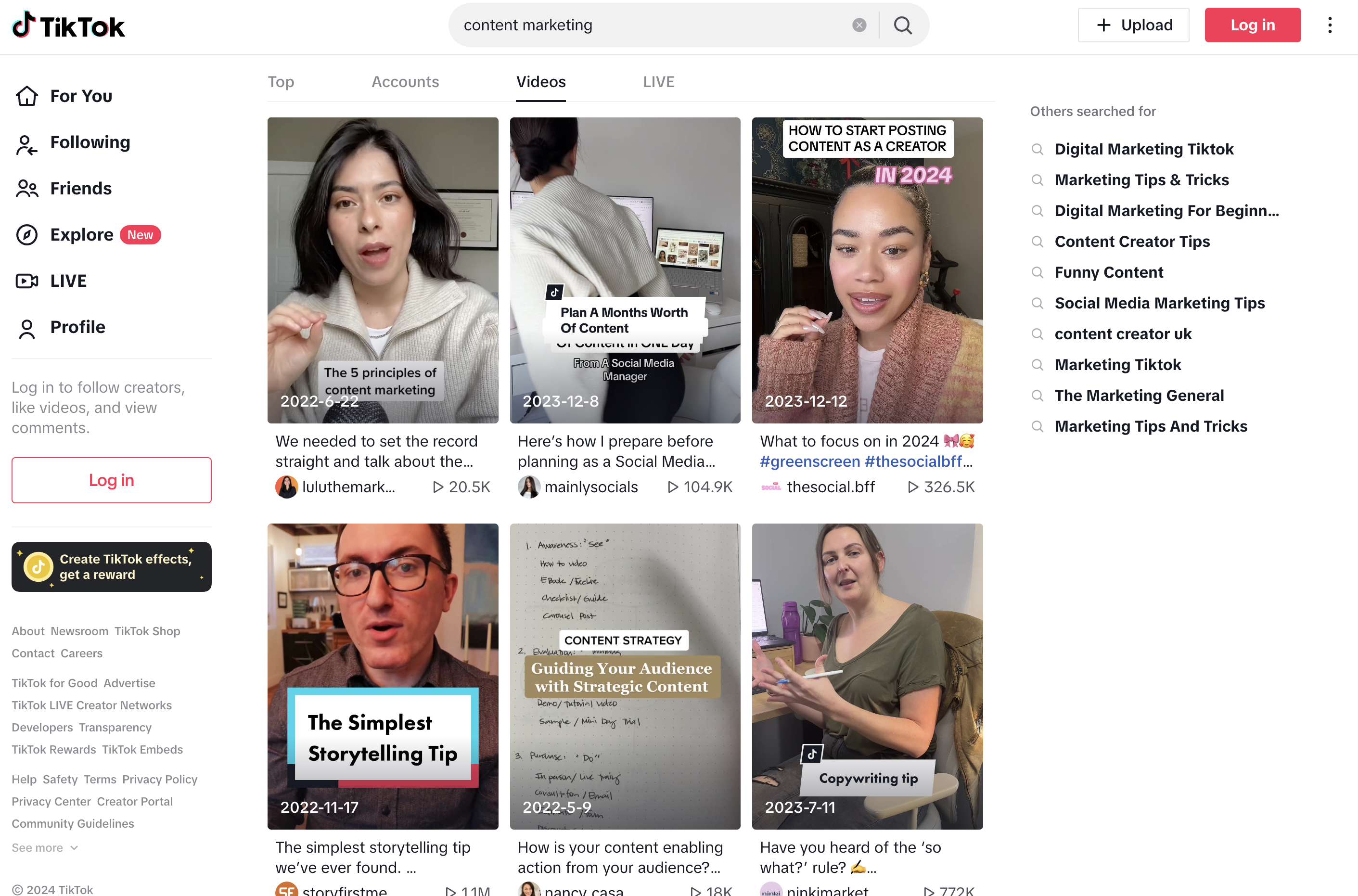 Screenshot from TikTok, February 2024
Screenshot from TikTok, February 2024Around 10 million videos are uploaded to TikTok every day on average, meaning there is always fresh video content to find and new takes on trending video formats.
Each video is clearly labeled with its upload date, so you can see how recently it was released and how many plays it has received.
8. Yandex
- Headquarters: Moscow, Russia.
- Launched: 1997.
- Founders: Elena Kolmanovskaya, Arkady Volozh & Ilya Segalovich.
Yandex is a Russian technology company with the biggest search engine market share in Russia and has been around longer than both Google and Bing’s predecessor, MSN Search.
Having launched back in 1997 as an exclusively Russian domain, Yandex Search has emerged as a global version of its services.
Yandex offers a massive search engine, along with features such as mail, maps, a browser, translation, images, and more, making it a significant competitor to Google in Russia.
As you may expect, Yandex also has a video search engine that can be used to find different results compared to other video search engines.
While it still pulls results from similar sources as other video search engines, Yandex has its own search algorithm for crawling and serving results as all search engines do.
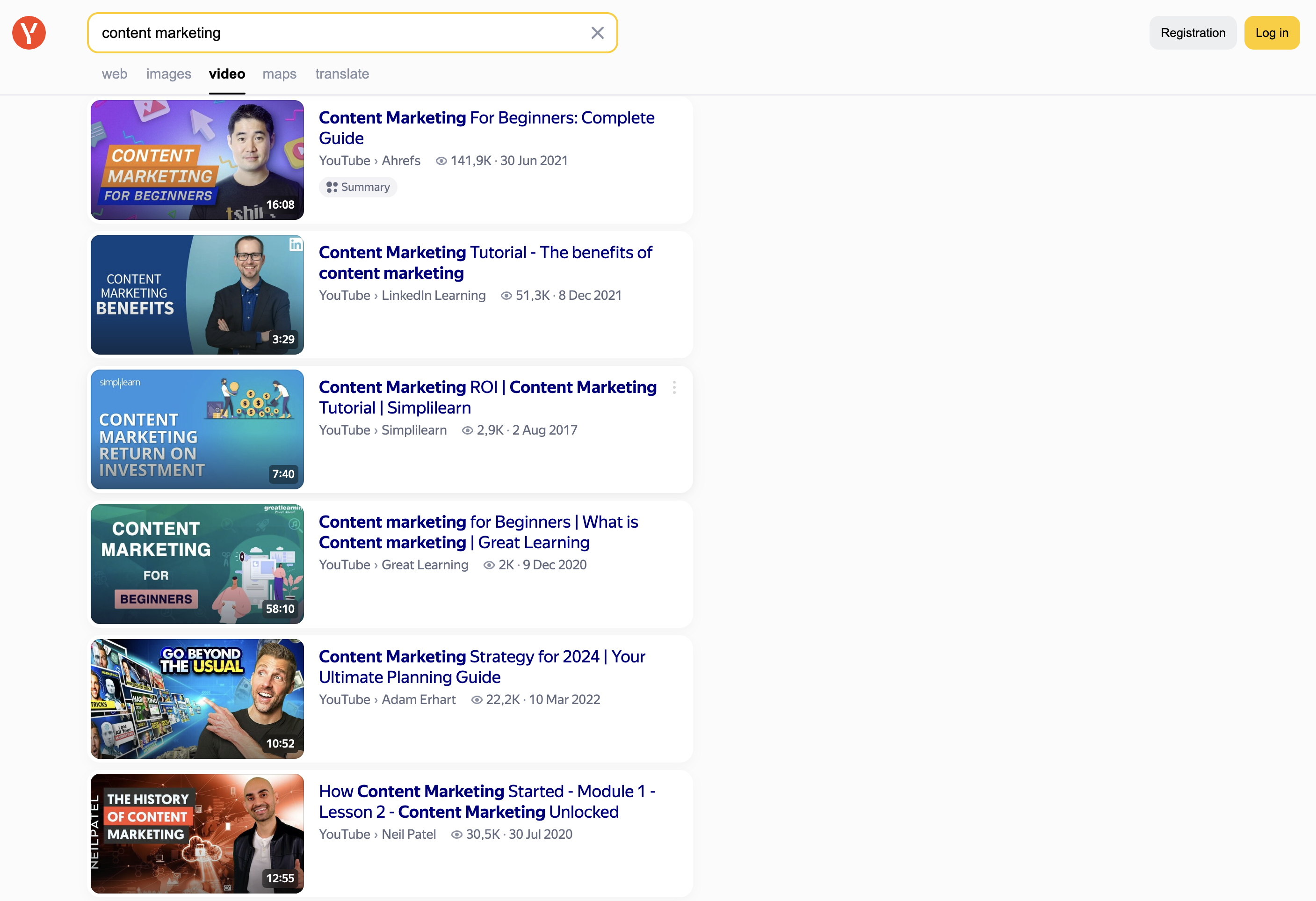 Screenshot from search for [content marketing], Yandex, February 2024
Screenshot from search for [content marketing], Yandex, February 20249. Ecosia
- Headquarters: Berlin, Germany.
- Launched: 2009.
- Founders: Christian Kroll.
Based in Berlin, Ecosia is a little different in terms of the video search engines out there.
While privacy is still a priority, Ecosia considers itself a social business and is committed to being CO₂-negative.
100% of Ecosia’s profits from ad revenue – generated by every search users make – go towards climate action. The majority of these are focused on tree-planting projects to help make the world a greener place.
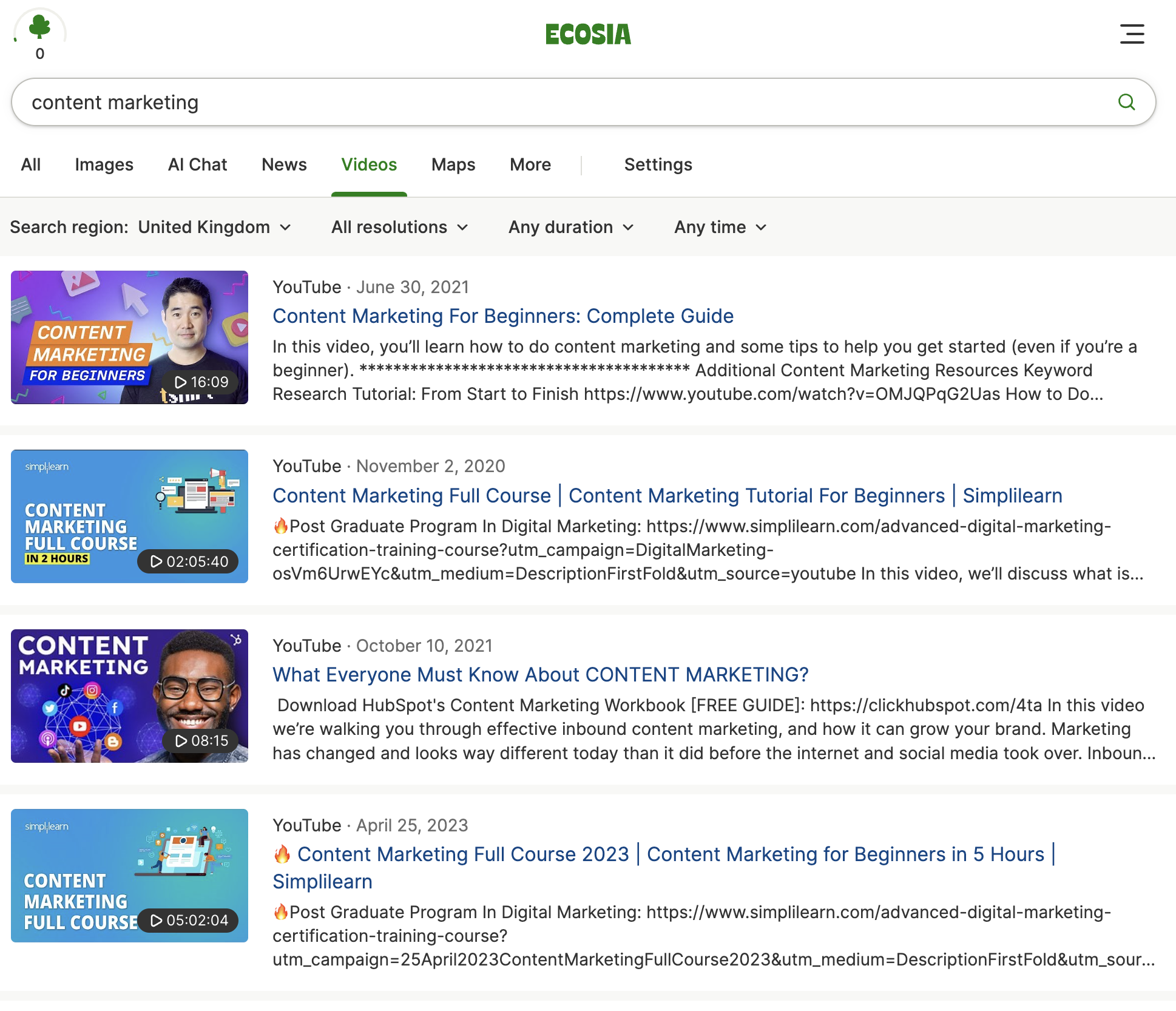 Screenshot from search for [content marketing], Ecosia, February 2024
Screenshot from search for [content marketing], Ecosia, February 2024Choosing Ecosia to do your video searches also enables you to use an eco-friendly search engine option, so you can do your bit for the planet while researching videos from YouTube and other platforms.
While you can log in to keep track of the number of trees you’ve helped to plant, Ecosia also doesn’t create a data profile on you. That means, you also get the benefit of running video searches that aren’t potentially skewed by your previous queries for other projects you might have been working on.
If you’re looking for video ideas but want to expand your searches, you can also use Ecosia’s AI Chat, which is powered by OpenAI and ChatGPT, in order to generate new video ideas or keywords you can search with.
10. Swisscows
- Headquarters: Egnach, Switzerland.
- Launched: 2014.
- Founders: Andreas Wiebe.
The proposition of Swisscows is somewhat unique among video search engine options.
While other engines have the option to engage filters to sift out explicit results, Swisscows deems itself a “family-friendly” search option with all explicit results entirely omitted.
Aside from music, images, and web content, Swisscows also has a video search feature that pulls in videos from across the web while filtering out any results that could be considered explicit.
This can be useful if you need to research a potentially risqué topic and want to be careful about what videos show up in your results.
![search for [content marketing], Swisscows](https://marketingnewswired.com/wp-content/uploads/2024/04/the-10-best-video-search-engines-via-sejournal-theshelleywalsh-14.png) Screenshot from search for [content marketing], Swisscows, February 2024
Screenshot from search for [content marketing], Swisscows, February 2024While Swisscows is working with Bing, which provides the search index for the site, you will still get different results than searching directly with Bing.
This is due to how Swisscows filters SERPs to omit results that don’t meet the criteria for being appropriate for all audiences. This goes for other popular video search engines, too, such as YouTube.
It’s worth noting that Swisscows also plays videos directly within the search engine, similar to Bing. This allows you to easily browse through videos and dip in and out without leaving the SERPs.
How To Find the Right Video For Your Content
When creating your own content online, adding a video can help to gain more visibility and improve engagement. The key factor is to ensure any videos you use are relevant to the rest of your content and don’t detract from what you want your user to do.
By using the video search engines listed above, you have the tools to find a variety of videos that can be both informative and interesting to your audience.
How Do I Reverse Video Search?
If you’ve found a video, but don’t know where it came from, you can do a reverse video search to find the source. That way, you can track down where it appears online and discover more about it – like finding the full version of a video from a short clip.
A reverse video search is very similar to a reverse image search. The search engine will look at the color and pixels in a video, and then find as close a match as possible from other videos on the web.
Google also has a handy “Search by image” function built into the Google Images section of the site where you can upload a screenshot from a video to help track down where else it appears online.
Read how to use a reverse video search to know more about this useful function.
Why Video Has Become Important For Content And SEO
It’s not just consumers who are favoring video content.
91% of businesses are using video marketing as a tool to help increase brand awareness and engage with their audience – with 70% of those who aren’t currently using video planning to start in 2024.
Around 90% of those marketers who have used video content have said it gives good ROI by expanding their audience and improving sales lead generation.
From testimonials to explainer videos and videographics, there are many cases for creating impactful video content to engage your audience in a more personable or exciting way.
By integrating video content into your digital marketing strategy in the right way, combined with relevant content creation and SEO strategies, you can help increase traffic and engagement online.
Ultimately, creating quality video content can help you achieve your key business goals, such as building a community around your business or improving customer retention, and work as part of your wider business strategy.
More resources:
Featured Image: ART PAL/Shutterstock
